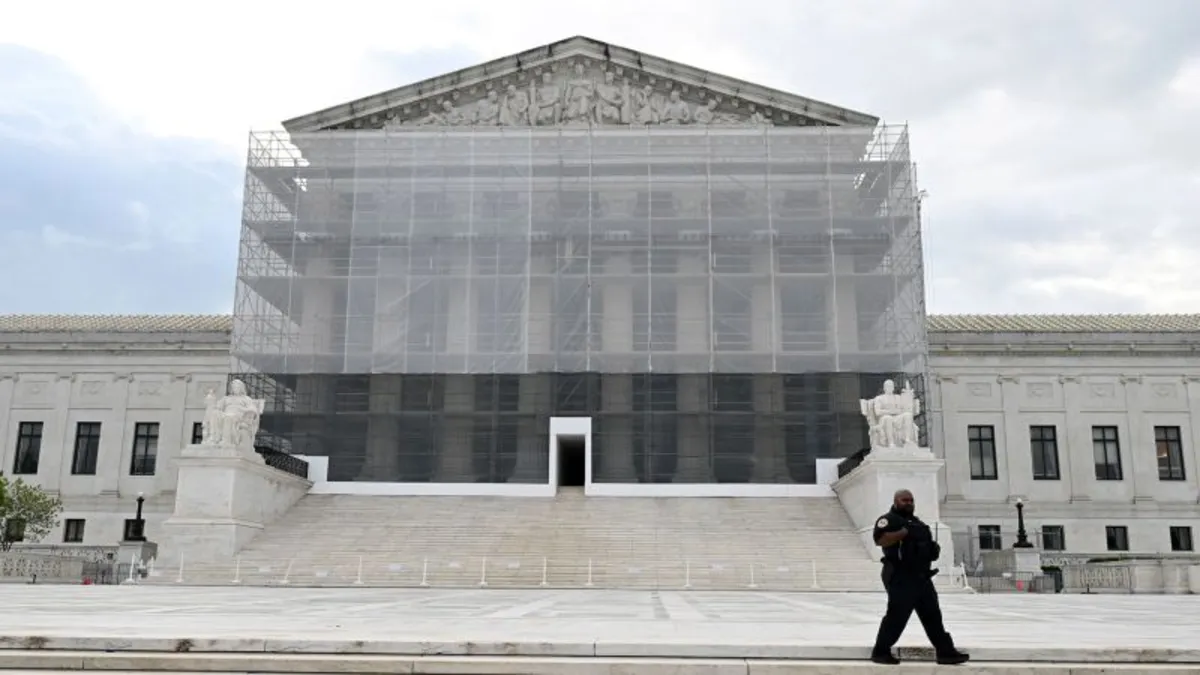
The Supreme Court faced a significant challenge on Thursday regarding the nation’s first proposed religious charter school, resulting in a 4-4 split decision. This evenly divided ruling upholds a previous judgment from Oklahoma's highest court, which deemed the establishment of the proposed Catholic school unconstitutional. The split occurred because Justice Amy Coney Barrett, a conservative member of the Court, recused herself due to her connections with the attorneys representing the St. Isidore of Seville Catholic Virtual School.
Justice Barrett’s recusal left the Supreme Court evenly divided, and while she did not provide an explanation for her decision, her ties to the case raised eyebrows. Over the past few years, religious groups have seen victories in the Court, where a conservative majority has allowed public funds to be allocated for religious education and programming. Critics argue that a favorable ruling for the proposed school could have significantly broadened the availability of taxpayer money for religious schools, or perhaps led states to reconsider their charter school initiatives.
In line with its standard procedure, the Supreme Court issued a brief, unsigned order indicating that the justices had divided evenly on the matter. The last time the Court experienced a 4-4 split was in 2022 concerning a technical issue related to locomotive inspections under federal law. Importantly, evenly split decisions do not create legal precedents, which allows the religious groups involved in this case to pursue future litigation.
While the Court did not disclose how individual justices voted, oral arguments do not always provide a clear indication of the outcome. During the hearings in April, Chief Justice John Roberts posed rigorous questions to both sides, suggesting that he was keeping his options open regarding the decision. Observers noted that three conservative justices appeared to back the school’s establishment, while the three liberal justices expressed opposition.
Charter schools are privately managed yet publicly funded institutions that serve approximately 3.8 million students across the United States. These schools aim to provide alternatives to traditional public education by offering innovative approaches and operating with fewer state regulations. Since their inception in the 1990s, the number of charter schools has surged, with around 8,000 currently in operation nationwide as of the 2023 school year. In Oklahoma, the law classifies these schools as public entities.
Support for the proposed school came from Oklahoma's Governor Kevin Stitt and former Attorney General John O’Connor, both Republicans. However, the political landscape shifted when newly elected Attorney General Gentner Drummond took office in 2023, withdrawing support for the school and eventually filing a lawsuit to halt its approval. The Oklahoma Supreme Court sided with Drummond, ruling that the school’s establishment contravened the First Amendment’s establishment clause.
In recent years, the Supreme Court has addressed appeals related to public funding for religious institutions through a different perspective. The Court has ruled that while the government is not obligated to open public programs to private entities, it cannot exclude religious organizations if it decides to do so. For example, in 2022, the Court ruled that Maine could not exclude religious schools from a public tuition assistance program, holding that such exclusions violated the First Amendment’s free exercise clause.
According to Steve Vladeck, a CNN Supreme Court analyst and professor at Georgetown University Law Center, the 4-4 split with Justice Barrett recused is not particularly shocking. However, the fact that the Court agreed to hear the case with her recusal raised questions about Chief Justice Roberts' potential alignment with the other four Republican appointees in favor of public funding for religious charter schools. The absence of an opinion accompanying the split decision suggests that, for the moment, he may not be inclined to support such funding.
This ongoing legal battle highlights the complex intersection of religion, education, and public funding in the United States, and the implications of the Supreme Court’s decisions will undoubtedly influence future cases in this contentious area.